Hi! Welcome! What follows is a rather lengthy look at the city-builder genre to see what made this style of game truly fun. If you want to know about me, my name is Drew. You may remember me as that guy that ate a lot of Taco Bell. Or as that guy that got a question answered on the last Alt+F1 podcast. I'm pretty awesome and famous. I hope you enjoy my writing. Let me know if you have any questions or concerns.
“This is around the office. You see them play. They're very min-max players. They want to prove they can make a certain amount of money per hour. Things like that. They tend to keep their camera back a little further. They treat all the Sims like they're just ants. They're a resource that they're using to power up their dreams. Then there's another type of player, myself included, who tend to make these really small, low-density cities. I like to watch people go to work. I keep the game on a slower speed. You can tell the min-maxers because they're usually running at cheetah speed. I think the game supports both play styles, both personalities, really well. It's really easy to go from one mode to the next. You can pause the game whenever you want. You can slow it down or speed it up.
It just depends on what mindset you're in at that moment. It is kind of mesmerizing, even for the min-maxers. Sometimes you'll just see them staring at a traffic intersection for a while, not doing anything. The patterns that all the cars and people make, they're just fascinating to watch. We let you pull the camera down fairly close, so you can see what's going on. Again, it depends on who you are and what you want to get out of the game. We try to support both styles.”[1] - Stone Librande
City builder games have changed exponentially since the days of SimCity in 1989. Mobile city builders have flourished. Maxis has come and, to some extent, gone, so dominance of the genre has been passed down to a new master: Cities: Skylines. Cities: Skylines is a new game developed by Colossal Order. It has been hailed by many as the game that SimCity (2013) should have been. Despite some misgivings I have about Skylines, I have spent some 20+ hours playing it in the course of the last week. As my city began to mature and grow into a bustling metropolis, I asked myself, “What makes a city builder fun?”
City builders are a subset of simulation games. Their most noteworthy feature is that they emphasize a no win condition. They are unlimited games that allow players to design and perfect their personal vision of a chosen city. Such a city could be a modern day utopia, a massive swatch of farmland, or a polluted industrial utopia. These games can encompass areas as small and specific as a town, or as vast and expansive as an empire. This post however, will focus on city or town builders, rather than an empire builder, for example.
It is important to note that my time with city builders is actually quite limited. I’m a touch on the young side, and this means that my first city builder was actually SimCity 3000. However, my love of building simulations dates back to such greats as RollerCoaster Tycoon, Age of Empires, and Stronghold (although I do have faint memories of watching SimTower be played).
The fun of city builders can be challenging to quantify. As it turns out, there is no single thing that makes a city builder fun. It’s partially what makes the genre have such a breadth and depth of fandom, and also what makes a good city builder a challenge to develop. The whole concept of fun within a city builder falls into a set I like to call “Build, Fail, Optimize, Admire, Progress.”
“...there is no way to win at SimCity other than what you decide to put into the game. If you come in with a certain goal in mind—perhaps, say, that you want a high approval rating and everyone should be happy all the time— then you would play very differently than if you went in wanting to make a million dollars or have a city with a million people in it.”[2] - Stone Librande
Build
Almost every city builder starts you from the same general point: a vast, green square of land, with a few inlets and outlets for travel. Over the course of the game, a player will take this blank canvas and create a massive, complex city built from scratch. It is this act of creation that sparks the popularity of games from many different genres such as Minecraft or Terraria. It opens up the act of design and creation to those who may not be artistically inclined. Taking a simple square and creating a bustling metropolis is a huge aspect of any city builder.
Building is such a core feature of a city builder that this “source of fun” serves as a foundation to the others. If a player doesn’t enjoy the most basic mechanic of building and developing a city, they will not keep playing. That is why it is important to hook the audience with strong building mechanics early on. Be it a satisfying sound and puff of dirt when you place a building, or a friendly chime, the player must enjoy even the most basic act of construction.
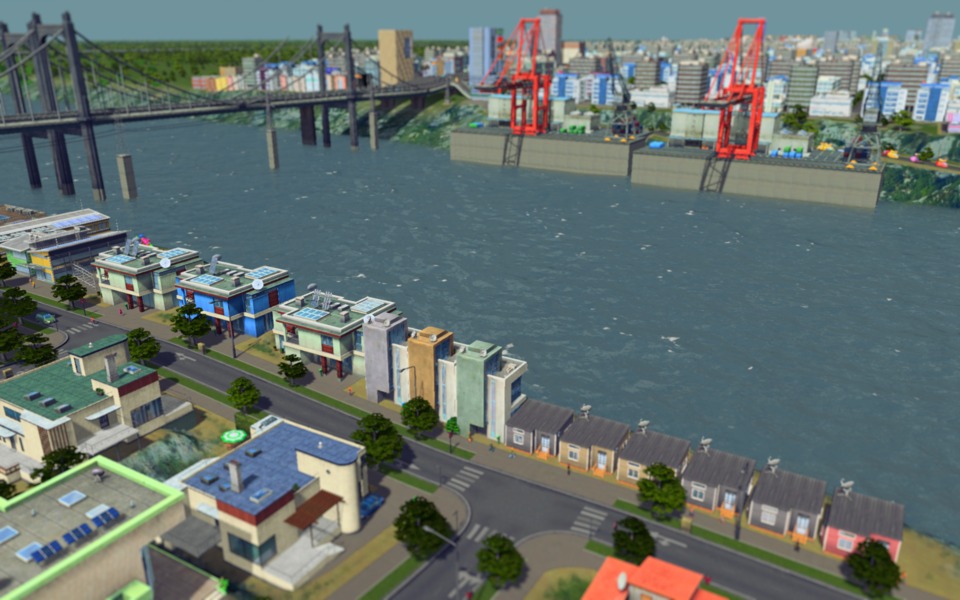
Zoning adds an interesting twist on the idea of placing every specific building in a precise location. Instead of having to spend your time meticulously placing each home, business, and industrial building, structures sprout up independently, due to demand. New families move in, proper industry is developed, and new businesses sell conveniences to local customers. This eliminates a significant portion of the tedium inherent to the core gameplay of other city builders. It also adds some amount of wonder and mystery to the world around you. Instead of every building being exactly where you placed it, some buildings may sprout up in ways you had never expected. For example, I found that a row of identical houses had been erected along the river. The sheer luck and comedy of the situation created fun in just the simple act of zoning an area of land.
“Like in SimCity, if you really think about playing the game, it’s more like gardening. So you’re kind of tilling the soil, and fertilizing it, and then things pop up and they surprise you, and occasionally you have to go in and weed the garden, and then you maybe think about expanding it, and so on.”[3] - Will Wright
Fail
City builders care not for you. They don’t automatically aim down your sights. They don’t coddle you with lives. They are merciless; deaf to your pleas. No, your brilliant plan to dam up the river won’t always work as intended. It’ll create a massive retention lake that floods your town. No, your lackluster firehouse placement will not survive the impending meteor storm set to destroy all of humanity. And no, your two lane road that leads into your town of 100,000 people will not cut it. For the same reasons players enjoy the uncaring nature of games like Dark Souls or Rouge-esque games, people love the unsympathetic square of green. The earth cares not for your paltry collection of stone and steel, and neither does the game. If your core design is flawed, you will fail and the game will do nothing to help you.
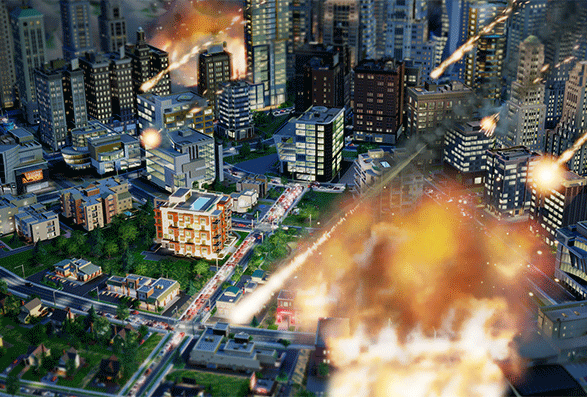
The callous nature of city builders has worn off in recent years. The lead developer of SimCity (2013), Stone Librande, stated in an interview with PC Gamer when asked about failure states, “There is one. I preface that by saying that we try to make none… You'll never lose. If you get down to zero dollars, it might be very painful to recover, but it's never game over.”[1] More often than not, modern city builders become almost impossible to lose. In order to approach a wider audience, they have enabled the difficulty curve to slide. This allows players to make woefully inefficient cities with massive miles long traffic jams that still generate hundreds of thousands of dollars a week. This change can be seen as both good and bad, however. Your city that you spent hours building won’t crumble before your eyes because your commercial buildings can no longer receive the supplies they so desperately need.
The decline of difficulty is not all bad. Allowing a larger market to enjoy video games is never a problem, but it does create a market for more “hardcore” games in the genre. It’s an interesting problem; as old as entertainment itself. Each piece of media must find its niche. But the increasing popularity of incredibly difficult games lends hope to those who prefer their simulations brutally difficult.
Optimize
Everyone who has ever played a modern-era city builder knows the feeling of a small road causing a massive traffic pileup, zoning homes and commercial in the best viable locations, and keeping the pollution of industry away from the homes of your frail citizens. Seeking out the weaknesses of your city, and patching the holes therein gives city builders the “just one more” mechanic that keeps the player up all night. There is always more to be fixed and always more to be built.
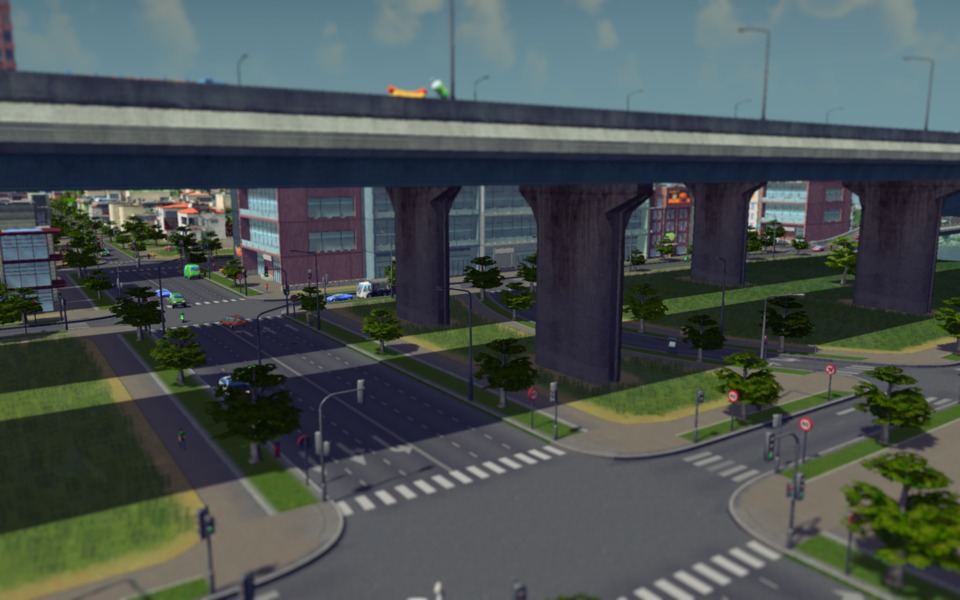
When asked if a city could achieve a perfect balance in SimCity (2013), Stone Librande replied “For a lot of players, harmony is not a desirable goal. You get harmony and that inspires you to mess with something… But the basic loop of the game, from the beginning stages up through the high-density buildings, is that when your city gets really happy, it grows. It grows in density. Every time that density growth happens, it puts pressure on your city.”[1] Playing a city builder is not something that can be set down and ignored; it is a constant evolution of a town. It must be tended to and fussed over, to make absolutely certain that every part of it is perfect.
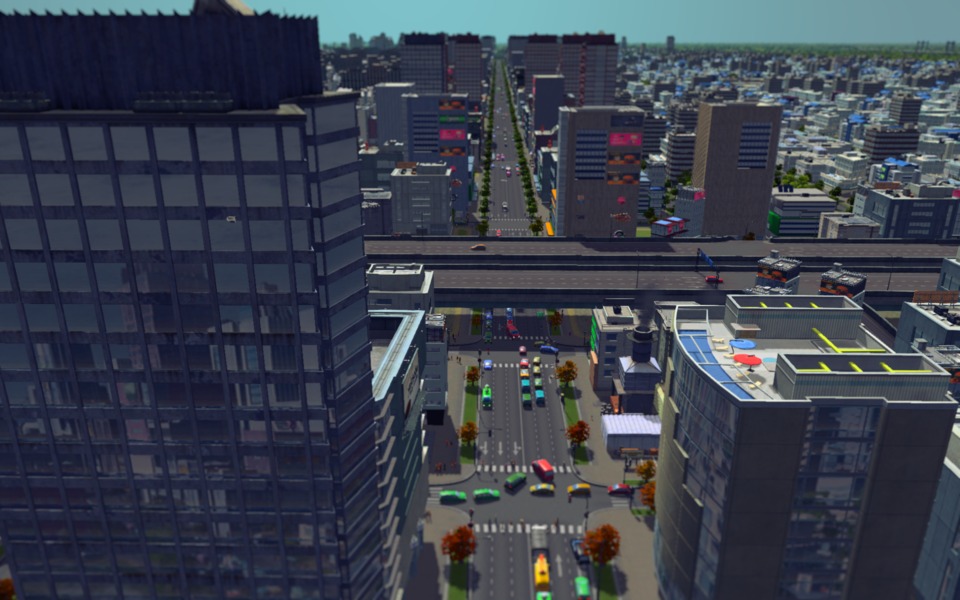
In many ways, this is the aspect of city builders that speaks to me the most. I often attempt to min-max my way to victory in games. And more often than not, this actually decreases my enjoyment of a game. Instead of playing the game in a free-flowing manner, I have planned several steps ahead, and must rigidly adhere to a set schedule. This isn’t as true with a city builder though. In city builders, planning and optimization is not only rewarded, but it is desired. This means that this aspect of how I play a game suddenly becomes a source of even more enjoyment.
Admire
There is something intensely cathartic about taking a game world and shaping it to your whim. Minecraft, Terraria, and other creative games have this concept at their core. Players can massively alter landscapes, and build massive structures. Players have taken their green canvas and turned it into a bustling utopia. Simply watching cars zip around your city going from one place to another can be exciting. Storylines can develop in your city. You may choose to specifically follow a single citizen in their travels around the town; watching as they go to school, find new jobs, entertain themselves and more. The life and times of even a singular citizen can be an interesting topic of an entire article.
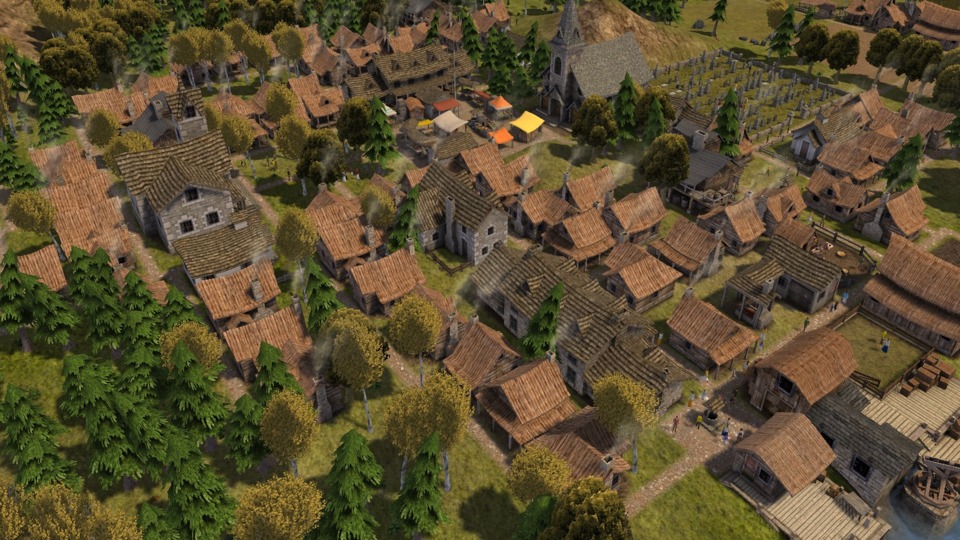
Much like Minecraft, the simple act of creation isn’t the only aspect that leads to enjoyment and admiration. It’s the adversity and challenge that the game puts in your way that leads to true admiration. By throwing up challenges at every turn, a player can look upon their creation and be satisfied in knowing that they not only developed and created this thing of beauty, but that it was done despite the adversity they faced along the way. Creation without challenge can still be enjoyable, but the feeling of having overcome and still succeeding is a much more substantial reward.
“...your mental model of the simulation is constantly evolving. And in fact you can look at somebody’s city that they designed at any point and see that it’s kind of a snapshot of their current understanding of the model. You can tell by what they’ve done in the game—’Oh, I see they think this freeway is going to help them because they put it over here.’ So it gives you some insight into their mental model of the game.”[3] - Will Wright
Progress
Progression is an incredibly common trait in games nowadays. Watching numbers count up to reach a goal has been distilled down to its very essence of fun. Games like Candy Box are simply counters that increase in value over time in order to reach goals and progression. In the same way, city builders have this progression. As population increases, rewards are unlocked. New buildings are available to be built, and new options are presented to players. While your small hamlet may have only started with dirty industry and small houses, through progression, players will soon be able to build towering skyscrapers and massive office complexes.
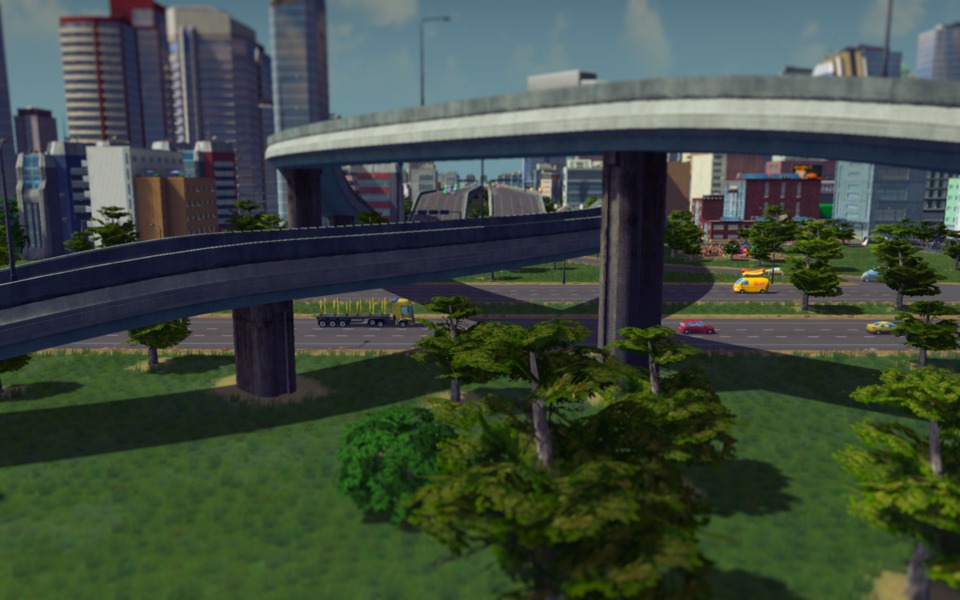
Creating artificial goals can be an important first step to introduce players to the game. Providing beginning players with a slow introduction of simple growth goals creates a clever difficulty ramp. For example, lets look at Cities: Skylines. When players first start a town, the only construction allowed is a single two-lane road. Once players place their first road, many new options become available. As your city gains more and more citizens, suddenly the player must account for fires, policing, healthcare, mortuary services, and many other things. What starts with a single road quickly expands to a much more complex simulation with many different and important inputs that must be kept in balance. The game must slowly introduce these new elements so as not to put off the player immediately. If the game presents all available options to the player immediately, it likely would confuse and deter any forward progression. The progression of the game provides an effective and powerful learning curve that allows a player to not only learn the full game, but also enjoy the progression in difficulty throughout.
A point of contention is when the progression runs out. Suddenly the player is left with no obvious goal to attempt to achieve. Once the last level of progression is achieved in Skylines, the need to progress and expand is invalidated. In fact, a player doesn’t even need to maintain the population that they previously attained to preserve their rewards. One can simply delete every bit of housing in his or her city and still perpetuate the achieved progression. For example, when I reached the last level of progression in Skylines, I lost all desire to continue playing. I could attempt to unlock all of the monuments in order to see all of the content the game had to offer, but they often involved hobbling my city. One such example is a requirement to have 100 abandoned buildings in a city at once. After spending an extended period with my town perfecting the modern utopia, I had absolutely no desire to cut it off at the knees, and stopped playing altogether.
Giving the player a sense of progression is important to almost all games. If a player does not feel that they have accomplished anything, they are not likely to want to continue playing. A sense of achievement can keep a player having fun, while a lack of achievement will quickly bore. This sense of progression works together in concert with the concept of admiration. In a sense, these two are one and the same. Progression creates the beauty of a well oiled city, and a desire to see future beauty can help drive progression.
Grok
I read a book a while back called “A Theory of Fun for Game Design” by Raph Koster. In it, he explains that every game boils down to a simple puzzle that you are trying to understand. Take chess or tic-tac-toe for example. At their core, there is a simple puzzle to be solved. All the player must do is grasp the solution in order to beat it. The underlying puzzle to tic-tac-toe is very simple, which gives it a much shorter lifespan than a more complex game like chess.
“’Grok’ is a really useful word. Robert Heinlein coined it in his novel Stranger in a Strange Land. It means that you understand something so thoroughly that you have become one with it and even love it. It’s a profound understanding beyond intuition or empathy (though those are required steps on the way).”[4]
Once you have mastered the puzzle, you have grokked the gameplay element. And just like every other game, SimCity has a puzzle that needs to be grokked. Don’t listen to me though, ask Will Wright:

“As a player, a lot of what you’re trying to do is reverse engineer the simulation. You’re trying to solve problems within the system, you’re trying to solve traffic in SimCity, or get somebody in The Sims to get married or whatever. The more accurately you can model that simulation in your head, the better your strategies are going to be going forward.”[3] Every player must grok the game in their own way, and with their own process. Fundamentally, understanding the puzzle that makes up the game is the true source of fun. Presenting the puzzle to the user in a clear and effective way is critical to effective game design. “The player has to be able to bootstrap themselves into understanding that model. You’ve got this elaborate system with thousands of variables, and you can’t just dump it on the user or else they’re totally lost.”[3]
Conclusion
Ultimately, many complex systems make up the fun of a city builder. Players may enjoy any part of “Build, Fail, Optimize, Admire, and Progress.” From the min maxing of optimization, to the uncaring green canvas of a new city, there is fun for anyone. It’s incredible that it manages to attract such a range of players and satisfies each of their individual interests. No matter the reason you like a game, enjoy it for the reasons you enjoy it! Hopefully, this could help you understand how other people enjoy and grok games in their own way. Thanks for reading!
I want to give a big thanks to @DannyHibiki and her husband for helping me edit my crazy mess of writing into something readable for you all to enjoy. I hope you enjoyed reading it as much as I enjoyed making it. Let me know what you thought in the comments.
So a final question to everyone: What do you enjoy about city builders? Did I miss something? Would you like to see more of these? On what topics or genres? Is rice an acceptable part of a burrito? (Spoilers: Its not.)
1. http://www.pcgamer.com/simcity-interview-failure-states-casinos-minecraft-and-the-working-class/
2. http://v-e-n-u-e.com/Sim-City-An-Interview-with-Stone-Librande
3. http://www.gamestudies.org/0102/pearce/
4. Koster, Raph. A Theory of Fun for Game Design. Sebastopol (Cali.): O'Reilly Media, 2014. Print.
Log in to comment